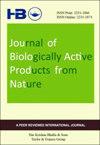鼠尾草肽段对胰岛素抵抗患者餐后血糖的影响
IF 1
Q4 CHEMISTRY, MEDICINAL
Journal of Biologically Active Products from Nature
Pub Date : 2021-07-04
DOI:10.1080/22311866.2021.1942987
引用次数: 0
摘要
摘要糖尿病是一种普遍的代谢紊乱,几乎在地球上的每一个群体中都存在。饮食对治疗和控制都有根本的影响。食用几种植物种子与葡萄糖耐受性和吸收能力的提高有关。进行了一项随机对照试验,通过餐后定量评估丹参种子水解肽组分对胰岛素抵抗或早期2型糖尿病患者血糖、血浆胰岛素和Matsuda DeFronzo指数的血糖影响。Chia和对照蛋白都与一部分液体食物混合,并提供给九名参与者。进行了混合食物耐受性曲线。食用Chia种子肽的受试者在30分钟后观察到葡萄糖浓度降低。然而,没有发现对血浆胰岛素有显著影响。食用奇亚籽肽组分可以降低T2D患者对碳水化合物的急性吸收,减轻餐后急性高血糖。然而,这些明显的益处似乎并不能调节胰岛素敏感性。本文章由计算机程序翻译,如有差异,请以英文原文为准。
Postprandial Glycaemic Effect of a Peptide Fraction of Salvia Hispanica in Patients with Insulin Resistance
Abstract Diabetes is a prevalent metabolic disorder among almost every single population on the planet. Diet has a fundamental impact on both treatment and control. The consumption of several plant seeds has been associated with improvement in glucose tolerance and absorption. A randomized controlled trial was conducted to evaluate the glycaemic effects of a hydrolyzed peptide fraction of Salvia hispanica seed through postprandial quantification on blood glucose, plasma insulin, and Matsuda-DeFronzo index in patients with insulin resistance or incipient type 2 diabetes. Both Chia and control proteins were mixed with a portion of liquid food and provided to nine participants. A mixed-food tolerance curve was performed. A reduction in glucose concentrations was observed after 30 minutes in subjects consuming Chia seeds' peptides. However, no significant effect on plasmatic insulin was found. The consumption of peptide fractions of Chia seeds could decrease the acute absorption of carbohydrates and attenuate acute postprandial hyperglycemia in patients with T2D. However, these apparent benefits do not appear to modulate insulin sensitivity.
求助全文
通过发布文献求助,成功后即可免费获取论文全文。
去求助
来源期刊

Journal of Biologically Active Products from Nature
Agricultural and Biological Sciences-Agricultural and Biological Sciences (miscellaneous)
CiteScore
2.10
自引率
0.00%
发文量
21
 求助内容:
求助内容: 应助结果提醒方式:
应助结果提醒方式:


